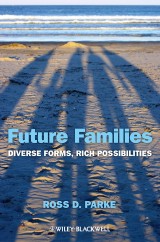Details

Future Families
Diverse Forms, Rich Possibilities1. Aufl.
|
44,99 € |
|
| Verlag: | Wiley-Blackwell |
| Format: | |
| Veröffentl.: | 28.08.2013 |
| ISBN/EAN: | 9781118602362 |
| Sprache: | englisch |
| Anzahl Seiten: | 312 |
DRM-geschütztes eBook, Sie benötigen z.B. Adobe Digital Editions und eine Adobe ID zum Lesen.
Beschreibungen
<p><i>Future Families</i> explores the variety of family forms which characterize our contemporary culture, while addressing the implications of these increasingly diverse family units on child development.</p> <ul> <li>Reveals the diversity of new family forms based on the most current research on fathers, same-gender parents, new reproductive technologies, and immigrant families</li> <li>Illustrates that children and adults can thrive in a variety of non-traditional family forms</li> <li>Shows the interrelatedness of new trends in family organization through the common themes of embedded families and caregiving in community and cultural contexts</li> <li>Features an interdisciplinary approach, drawing from works in areas that include child development, family studies, sociology, cross-cultural scholarship, ethnic studies, biology, neuroscience, anthropology and even architecture</li> <li>Sets an agenda for future research in the area of families by identifying important gaps in our knowledge about families and parenting</li> </ul>
<p>Preface vi</p> <p>Acknowledgments ix</p> <p>About the Author xi</p> <p>1 Challenges to the Ideal Family Form 1</p> <p>2 Changing Parental Roles: The Sharing and Redistribution of Family Responsibility in Contemporary Families 25</p> <p>3 Further Assaults on the “Ideal” Family Form: Divorce, Remarriage, Single Parenthood, and Cohabitation 55</p> <p>4 Same-Gender Families: Are Two Mothers or Fathers Good Enough? 84</p> <p>5 How Many “Parents” Are Too Many? Insights from the Assisted Reproductive Technologies Front 111</p> <p>6 Many Mothers, Many Fathers, Many Others: Insights from Other Cultures 141</p> <p>7 All about Relatives and Fictive Relatives: Insights from Diverse Ethnic Groups in Our Own Culture (Past and Present) 160</p> <p>8 Multiple Caregivers: Harmful or Helpful for Caregivers Themselves 191</p> <p>9 In Support of Alternative Family Forms: Overcoming the Barriers to Change 209</p> <p>References 243</p> <p>Index 292</p>
<p>Link to review in <a href="http://issuu.com/ucriverside/docs/ucr_magazine_winter_2014?e=2768134/6969848">Issuu.com</a> - Winter 2014<br /> <br /> “The book is best thought of as a stimulus to new conversations about our conception of families and an exploration of the implications of changing family forms for children’s development.” (<i>Society for Research in Child Development</i>, 1 January 2014)</p>
<p><b>Ross D. Parke</b> is Distinguished Professor of Psychology, Emeritus, and past Director of the Center for Family Studies at the University of California, Riverside. He has authored or co-authored several books on the field, including <i>Fathers and Fatherhood</i>, <i>Throwaway Dads</i>, <i>Child Psychology: A Contemporary Perspective</i>, and <i>Social Development</i>.</p>
<p><i>Future Families</i> explores the variety of family forms which characterize our contemporary culture while addressing the implications of these increasingly diverse family units on child development. Noted psychologist Ross Parke traces the shifts in parental roles resulting from increased divorce rates, single-parent families, cohabiting couples , same-gender parental relationships, and other non-traditional family types.</p> <p>Parke reveals how the ideal nuclear family stereotype is further challenged by non-traditional family forms introduced through outside cultures, ethnic variations within our own culture, and assisted reproductive technologies. He offers recommendations as to how social policies can be modified to better reflect the new diversity of family forms and suggests ways to provide support for all families to improve the lives of adults and children. Timely and enlightening, <i>Future Families</i> offers rich insights into ways contemporary society has redrawn the boundaries of family.</p>
Ross Parke's wonderful book arrives in a time when political culture wars have intensified (again), with widely clashing views about what ideal families <i>should</i> be like. Parke provides a detailed and engaging account of the diversity of contemporary families, laying waste along the way to many widely-held myths about what is healthy for parents and children that have dominated current discussions without paying attention to the evidence. This book will serve as the new go-to reference source for family scholars and their students in the social sciences and humanities. It will also be required reading for (open-minded) political decision-makers and family-service providers who are concerned with how we allocate resources for families, especially in these times of economic distress.<br /> —<b><i>Professors Carolyn and Philip Cowan,</i></b> Professors Emeriti, University of California, Berkeley <p><i>Future Families: Diverse Form, Rich Possibilities</i> is the best introduction to the topic of family diversity that I have seen to date. A succinct but remarkably comprehensive treatment of the topic of family diversity.<br /> —<i><b>Professor Frank Furstenberg</b></i>, Department of Sociology, University of Pennsylvania</p> <p>This is the most important book on the family to have been written in the 21st Century. It is unsurpassed in terms of its sensitive and erudite consideration of the key questions raised by contemporary family forms and the extent to which these questions can be answered by empirical research. It is brings the topic alive by including real-world examples and discussion of the social and psychological implications of Future Families – a "must-read" for everyone with an interest in family life today.<br /> —<i><b>Professor Susan Golombok</b></i>, Centre for Family Research, University of Cambridge<br /> <br /> Even Tolstoy, who thought “all happy families resemble one another,” could not have imagined the diversity of forms those happy families take, but Ross Parke has. In this innovative book he provides context, understanding, and the scientific basis for appreciating differences in numbers of parents, gender of parents, and sources of children. His scholarship will inform professionals, parents, policy-makers, students, and faculty about the continuing changes in modern family structure and life.<br /> —<i><b>Arnold Sameroff, Ph. D.</b></i> , Professor Emeritus of Psychology, University of Michigan<br /> <br /> </p>
Diese Produkte könnten Sie auch interessieren:

Cognitive-Behavioural Therapy for ADHD in Adolescents and Adults

von: Susan Young, Jessica Bramham

41,99 €

Cognitive-Behavioural Therapy for ADHD in Adolescents and Adults

von: Susan Young, Jessica Bramham

41,99 €

Offenders with Developmental Disabilities

von: William R. Lindsay, John L. Taylor, Peter Sturmey

53,99 €













